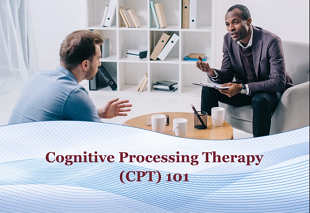PTSD: National Center for PTSD
Cognitive Processing Therapy (CPT) 101
Continuing Education
This section brings together free in-depth Continuing Education resources for the Professional community concerned with trauma.
Cognitive Processing Therapy (CPT) 101
- Date Created: 07/ 1/2020
- Time to Complete: 1 hour
- Credits: ANCC, APA, ASWB, ACCME, Other Orgs
- Skill Level: Intermediate
- Course Series: PTSD 101
 Author(s):
Author(s):
Description
The revised 2017 VA/DoD Clinical Practice Guideline for PTSD recommends Cognitive Processing Therapy (CPT) as a first-line treatment. This course reviews the evidence for various CPT modalities—including CPT with and without a written account, group and individual formats, and with people who have co-occurring conditions such as depression or substance abuse.
Dr. Galovski describes pretreatment assessment issues—such as whether CPT is appropriate for a specific patient—and offers examples of how to describe CPT to potential clients. Using patient videos, the course presents a session overview of CPT and offers illustrations of how to facilitate trauma processing and challenge inaccurate thoughts (or stuck points) with clients.
Goals and Objectives
- Describe the evidence supporting CPT as a treatment for PTSD.
- Describe the components of CPT and differences between the CPT versions with and without a trauma account.
- List current and future areas of CPT research.


























